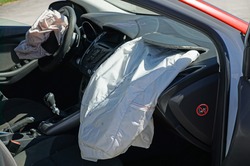Imagine you’ve just gotten into your car. You turn it on and BOOM your airbag deploys for no reason. Or, your car hits a pothole, and BANG your airbag explodes from the steering wheel.
 During accidents, airbags save lives – the National Highway Traffic Safety Administration reports that frontal airbags saved 25,782 lives between 1987 and 2008. But, what about when an airbag deploys for no reason? Car manufacturers have had to recall car and truck models because the airbags inexplicably deployed. When that happens, there are major risks associated with your airbags, including risks to your hearing.
During accidents, airbags save lives – the National Highway Traffic Safety Administration reports that frontal airbags saved 25,782 lives between 1987 and 2008. But, what about when an airbag deploys for no reason? Car manufacturers have had to recall car and truck models because the airbags inexplicably deployed. When that happens, there are major risks associated with your airbags, including risks to your hearing.
In an accident, your airbag needs to deploy in the milliseconds between when the airbag controller senses a collision and when you slam into the steering wheel. In order to do this, the airbag has to deploy with explosive force, at speeds up to 200 miles per hour. That generates a lot of noise.
 Illinois Personal Injury Lawyer Blog
Illinois Personal Injury Lawyer Blog


